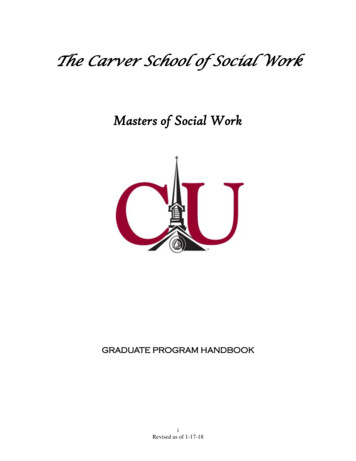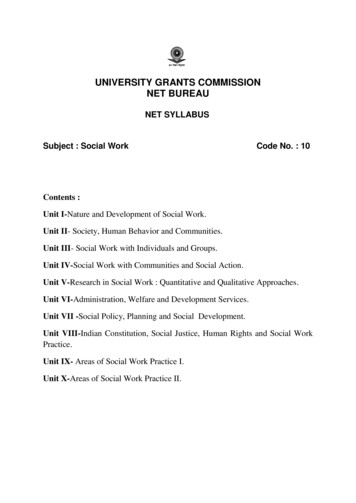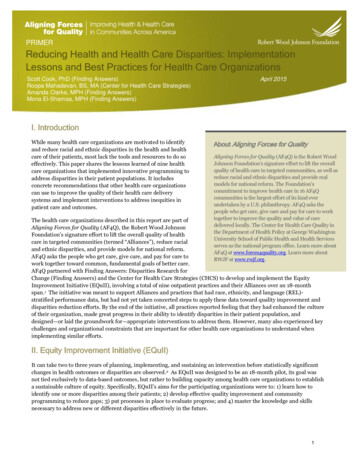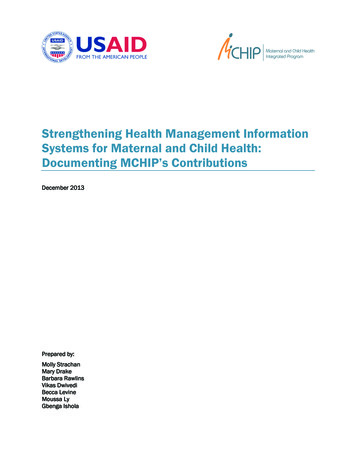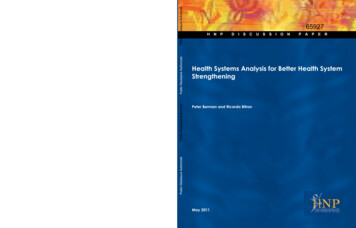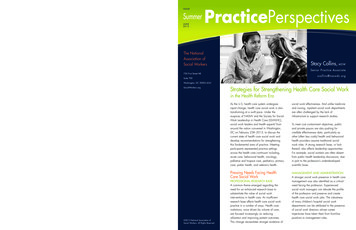
Transcription
ISSUECenter for Workforce Studies & Social Work Practice Recent PublicationsChildren & FamiliesPoverty Social Work Services with Parents: How Attitudes andApproaches Shape the Relationship The Affordable Care Act: Implications for Low andModerate-Income Women’s Health and Well-Being Overcoming Economic l Social Work 2012 Medicare Updates for Clinical Social WorkersClinical Social Workers and 5010: Frequently Asked QuestionsClinical Social Workers Be Aware: Version 5010 is ComingDocumenting For Medicare: Tips For Clinical Social WorkersRetiring? Tips For Closing Your Private PracticeRisk Management In Clinical PracticeEducation Addressing the Educational Needs of Older Youth Gangs: A Growing Problem in SchoolsLeadership and Organizations Beyond Survival: Ensuring Organizational Sustainability NASW Leadership in Palliative & Hospice Social Work Organizational Integration of Cultural Competency:Building Organizational Capacity to Improve ServiceDelivery to Culturally Diverse Populations Organizing For Office SafetyPractice PerspectivesSummerWorkforce & Career Development Accountable Care Organizations (ACOs): Opportunitiesfor the Social Work Profession Career Coaching: A Valuable Resource For Social Workers Furthering Your Social Work Education: Obtaining A Doctorate Negotiating A Higher Salary Networking: Finding Opportunities for Career Development Securing The Social Work Job You Seek: Advice For TheInterview Process Setting and Maintaining Professional Boundaries State Health Insurance Exchanges: What Social WorkersNeed to Know The Value Of Social Work Mentoring Transitioning Across State Lines: Licensing Tips Beyond9 To 5: Working As A ConsultantThe NationalAssociation ofSocial WorkersStacy Collins, M S WSenior Practice Associate750 First Street NEscollins@naswdc.orgSuite 700Washington, DC 20002-4241SocialWorkers.orgStrategies for Strengthening Health Care Social Workin the Health Reform EraAs the U.S. health care system undergoesrapid change, health care social work is alsotransforming at a swift pace. Under theauspices of NASW and the Society for SocialWork Leadership in Health Care (SSWLHC),social work leaders and health expertsi fromaround the nation convened in Washington,DC on February 25th 2013, to discuss thecurrent state of health care social work anddevelop recommendations for strengtheningthis fundamental area of practice. Meetingparticipants represented practice settingsacross the health care continuum including,acute care, behavioral health, oncology,palliative and hospice care, pediatrics, primarycare, public health, and veteran’s health.June 2013750 First Street NE, Suite 700Washington, DC 20002-4241SocialWorkers.orgPressing Needs Facing HealthCare Social WorkPROFESSIONAL RESEARCH BASE 2013 National Association ofSocial Workers. All Rights Reserved.A common theme emerged regarding theneed for an enhanced research base tosubstantiate the value of social workinterventions in health care. An insufficientresearch base affects health care social workpractice in a number of ways. Health careinstitutions, once driven by volume of care,are focused increasingly on reducingutilization and improving patient outcomes.This change necessitates stronger evidence ofsocial work effectiveness. And unlike medicineand nursing, inpatient social work departmentsare often challenged by the lack ofinfrastructure to support research studies.To meet cost containment objectives, publicand private payors are also pushing forcredible effectiveness data, particularly asother (often less costly) health and behavioralhealth providers assume traditional socialwork roles. A strong research base, or lackthereof, also affects leadership opportunities.For example, social workers are often absentfrom public health leadership discussions, duein part to the profession’s underdevelopedscientific base.MANAGEMENT AND ADMINISTRATIONA stronger social work presence in health caremanagement was also identified as a criticalneed facing the profession. Experiencedsocial work managers can elevate the profileof the profession and preserve and createhealth care social work jobs. The robustnessof many children’s hospital social workdepartments can be attributed to the presenceof social work directors whose careertrajectories have taken them from front-linepositions to management roles.
GREATER PROFESSIONAL DISTINCTION“It no longer mattershow many peoplewe see. We needto document theimpact on patientsand families of thework we do.”– James Zabora“There are notenough socialworkers seeking[behavioral healthWith more disciplines poised to assumetraditional social work functions, health caresocial workers are challenged to demonstratetheir distinction from other health care providers.Social workers need to recognize the importanceof interdisciplinary, team-based care whileemphasizing their distinctive training and skills.Without distinguishing its unique capabilities, thesocial work profession may be relegated to asubordinate status within health care institutions,rather than being viewed as a vital contributionto patient health and well-being.SPECIALIZED TRAININGThe changing health care landscape calls forenhanced social work education and training. Forexample, the profession must address the shortageof social work educational opportunities that reflectthe depth and scope of palliative care, as theresources currently available are insufficient for thisgrowing area of social work practice. Greateravailability of social work leadership training isalso necessary, to cultivate a future workforce ofsocial work managers in health care settings. And,as heath care becomes more technologicallydriven, social workers need additional training intechnology skills, particularly in telemedicine,video conferencing and social media.care managementEmerging Opportunities for SocialWorkers in Health Care Settingsand administrative]DISTRESS SCREENING FOR INDIVIDUALSWITH CANCERpositions.”Distress screening, which soon will be mandatoryat all Commission on Cancer (CoC)–accreditedcancer centers, is a unique opportunity for socialworkers to assume a leadership role in theprovision of an essential health care service.The CoC mandate is based on evidenceindicating that cancer-related distress is a nearlyuniversal experience, which, until recently, hasbeen largely ignored by health care providers.Beginning in 2015, distress screening mustbe offered at pivotal visits, which may includeinitial consultation, pre and post-surgery,initiation of chemotherapy, and completionof active treatment.– John MistrangeloSocial workers are largely responsible forresponding to patients experiencing high levels ofcancer-related distress. With nearly 1.7 millionnew cancer diagnoses each year in the U.S.(American Cancer Society, 2013), the opportunityto demonstrate the effectiveness of social workinterventions is significant. Demonstrating thebenefit of distress screening for individuals withcancer also positions social workers to advocatefor expansion of this service to patients with otherchronic conditions.EMERGENCY DEPARTMENT SERVICESHospitals are increasingly employing socialworkers in emergency departments (Van Pelt,2010). Pediatric hospitals are at the cutting edgeof this area of practice. Most free-standingchildren’s hospitals have 24-hour social workcoverage in the emergency department, wherethey provide mental health evaluation, stabilization,assessment for suicidal ideation and drug/alcohol use, and psychosocial support andconsultation for trauma and family violencecases. Emergency department social workers areoften the primary coordinators of psychiatric crisisteams in children’s hospitals. They frequentlyserve as the bridge between the patient and thefamily – and they ensure the patient’s safetransition back to the community. More recently,hospitals have explored the use of social workersin emergency departments to address thepsychosocial concerns of individuals withouturgent medical needs that require emergencycare or admission (Auerbach & Mason, 2010).SPECIALIZED SOCIAL WORK CLINICALINTERVENTIONSSpecialized social work clinical interventions,such as psychoeducation, cognitive-behavioralintervention, disease management groups, andshort-term psychotherapy during hospitalization,hold the potential for improving outcomes whilereducing cost and utilization. Palliative care isalso an emerging social work clinical specialty.People with serious or life threatening illnessescan benefit from palliative care, which can beintegrated into patient care beginning at the timeof diagnosis until the end of life. This specialtyarea offers social workers the opportunity toemploy their generalist and specialist training,as well as their ecological viewpoint.POST-DISCHARGE CARE COORDINATIONHistorically, hospital discharge planning hasbeen a social work function. But until recently,hospital social workers had little contact with apatient post-discharge - and often no verificationthat a treatment plan had been followed.Hospital social workers have challenged thislimited role by expanding into care transitionfunctions. Rush University Medical Center (Rush)has developed an evidence-based model, theEnhanced Discharge Planning Program (EDPP), asocial work-led, post-discharge intervention toassist older adults in safely transitioning back to thecommunity. Through telephonic care coordination,hospital-based social workers ensure fullimplementation of the discharge plan, assist witharranging community resources and follow-upappointments, and address issues that arise forpeople with complex conditions. A randomizedcontrol trial of the EDPP showed positive results,including increased medication understanding,decreased stress, and better adherence toscheduling and attending follow-up medicalappointments (Altfeld et al., 2012). By ensuringsafe transitions from hospital to home, Rush socialworkers have demonstrated their value to theinstitution. EDPP has been replicated at sitesacross the country.PRIMARY CARE SETTINGS/MEDICAL HOMESSocial workers are increasingly present in medicalhomes (also known as health homes) and otherprimary care settings. These settings allow socialworkers to combine their behavioral healthtraining with their health promotion and diseaseprevention skills. The Veterans Administration (VA)has developed a unique medical home model,the Patient Aligned Care Team (PACT). PACTteams are multi-interdisciplinary, with socialworkers serving as health care advocates, casemanagers and mental health clinicians. The PACTmodel demonstrates the breadth of health caresocial work functions.COMMUNITY-BASED MENTAL ANDBEHAVIORAL HEALTH SERVICESMental and behavioral health administratorsrecognize the broad benefit of social workers, whobring experience in community-based treatment,awareness of the social determinants of health,and an understanding of the interdependence ofphysical and mental well-being. Like their hospital-based colleagues, mental and behavioral healthsocial workers focus on maintaining clients in thecommunity, reducing readmissions, ensuring accessto coordinated care, and serving as a bridgebetween the client and the health care institution.Mental and behavioral health is a growth areafor social workers, fueled by the Affordable CareAct’s (ACA) significant investment in preventionand treatment of substance abuse and mentalhealth disorders, and the value that the mentaland behavioral health sector places on socialwork services.PREVENTION AND PUBLIC HEALTHINTERVENTIONSMuch of health care social work is preventionbased, but the profession often fails to identify itas such. Supporting HIV medication adherence,providing home visitation services for at-riskmothers and newborns, and addressingchildhood obesity are all examples of socialwork prevention and public health interventions.Social workers are well-positioned to take aleadership role in new ACA prevention programs.Furthermore, new research fields, especiallypatient-centered outcomes research andcommunity-based participatory research, offer anopportunity for social workers to contribute to theprevention and public health research base.“On a day-to-daybasis, we work inteams with our healthcare colleagues andwhile there are manyshared aspects of thespecialty, our skill setsare unique. Whereasphysicians and nursesmay assess forpsychosocial needs,they generally do nothave the depth oftraining that allowsthem to intervenewith the expertise ofa trained socialworker.”– Terry AltilitoNew Opportunities in theAffordable Care ActACCOUNTABLE CARE ORGANIZATIONS(ACOs) AND HEALTH HOMESThe ACA invests heavily in these care deliverymodels, which seek to improve patient outcomesand lower health care costs through greaterintegration of acute care, primary care and othercommunity-based services. The ACA’sdemonstration projects involving ACOs andhealth homes open a window for social workersto use their skills in patient navigation, mentaland behavioral health integration, and carecoordination (Collins, 2011). To thrive, ACOsand health homes will need to rely heavily onthis social work skill set. Social workers involvedin these models, whether as mental andbehavioral health clinicians or as care coordinators,are also well positioned to advocate for the useof qualitative outcome measures to gauge patientsatisfaction and well-being.“[Social workdirectors] havebecome influentialleaders within theirinstitutions and manyhave advanced tokey hospitaladministrativepositions.”– Ed Woomer
GREATER PROFESSIONAL DISTINCTION“It no longer mattershow many peoplewe see. We needto document theimpact on patientsand families of thework we do.”– James Zabora“There are notenough socialworkers seeking[behavioral healthWith more disciplines poised to assumetraditional social work functions, health caresocial workers are challenged to demonstratetheir distinction from other health care providers.Social workers need to recognize the importanceof interdisciplinary, team-based care whileemphasizing their distinctive training and skills.Without distinguishing its unique capabilities, thesocial work profession may be relegated to asubordinate status within health care institutions,rather than being viewed as a vital contributionto patient health and well-being.SPECIALIZED TRAININGThe changing health care landscape calls forenhanced social work education and training. Forexample, the profession must address the shortageof social work educational opportunities that reflectthe depth and scope of palliative care, as theresources currently available are insufficient for thisgrowing area of social work practice. Greateravailability of social work leadership training isalso necessary, to cultivate a future workforce ofsocial work managers in health care settings. And,as heath care becomes more technologicallydriven, social workers need additional training intechnology skills, particularly in telemedicine,video conferencing and social media.care managementEmerging Opportunities for SocialWorkers in Health Care Settingsand administrative]DISTRESS SCREENING FOR INDIVIDUALSWITH CANCERpositions.”Distress screening, which soon will be mandatoryat all Commission on Cancer (CoC)–accreditedcancer centers, is a unique opportunity for socialworkers to assume a leadership role in theprovision of an essential health care service.The CoC mandate is based on evidenceindicating that cancer-related distress is a nearlyuniversal experience, which, until recently, hasbeen largely ignored by health care providers.Beginning in 2015, distress screening mustbe offered at pivotal visits, which may includeinitial consultation, pre and post-surgery,initiation of chemotherapy, and completionof active treatment.– John MistrangeloSocial workers are largely responsible forresponding to patients experiencing high levels ofcancer-related distress. With nearly 1.7 millionnew cancer diagnoses each year in the U.S.(American Cancer Society, 2013), the opportunityto demonstrate the effectiveness of social workinterventions is significant. Demonstrating thebenefit of distress screening for individuals withcancer also positions social workers to advocatefor expansion of this service to patients with otherchronic conditions.EMERGENCY DEPARTMENT SERVICESHospitals are increasingly employing socialworkers in emergency departments (Van Pelt,2010). Pediatric hospitals are at the cutting edgeof this area of practice. Most free-standingchildren’s hospitals have 24-hour social workcoverage in the emergency department, wherethey provide mental health evaluation, stabilization,assessment for suicidal ideation and drug/alcohol use, and psychosocial support andconsultation for trauma and family violencecases. Emergency department social workers areoften the primary coordinators of psychiatric crisisteams in children’s hospitals. They frequentlyserve as the bridge between the patient and thefamily – and they ensure the patient’s safetransition back to the community. More recently,hospitals have explored the use of social workersin emergency departments to address thepsychosocial concerns of individuals withouturgent medical needs that require emergencycare or admission (Auerbach & Mason, 2010).SPECIALIZED SOCIAL WORK CLINICALINTERVENTIONSSpecialized social work clinical interventions,such as psychoeducation, cognitive-behavioralintervention, disease management groups, andshort-term psychotherapy during hospitalization,hold the potential for improving outcomes whilereducing cost and utilization. Palliative care isalso an emerging social work clinical specialty.People with serious or life threatening illnessescan benefit from palliative care, which can beintegrated into patient care beginning at the timeof diagnosis until the end of life. This specialtyarea offers social workers the opportunity toemploy their generalist and specialist training,as well as their ecological viewpoint.POST-DISCHARGE CARE COORDINATIONHistorically, hospital discharge planning hasbeen a social work function. But until recently,hospital social workers had little contact with apatient post-discharge - and often no verificationthat a treatment plan had been followed.Hospital social workers have challenged thislimited role by expanding into care transitionfunctions. Rush University Medical Center (Rush)has developed an evidence-based model, theEnhanced Discharge Planning Program (EDPP), asocial work-led, post-discharge intervention toassist older adults in safely transitioning back to thecommunity. Through telephonic care coordination,hospital-based social workers ensure fullimplementation of the discharge plan, assist witharranging community resources and follow-upappointments, and address issues that arise forpeople with complex conditions. A randomizedcontrol trial of the EDPP showed positive results,including increased medication understanding,decreased stress, and better adherence toscheduling and attending follow-up medicalappointments (Altfeld et al., 2012). By ensuringsafe transitions from hospital to home, Rush socialworkers have demonstrated their value to theinstitution. EDPP has been replicated at sitesacross the country.PRIMARY CARE SETTINGS/MEDICAL HOMESSocial workers are increasingly present in medicalhomes (also known as health homes) and otherprimary care settings. These settings allow socialworkers to combine their behavioral healthtraining with their health promotion and diseaseprevention skills. The Veterans Administration (VA)has developed a unique medical home model,the Patient Aligned Care Team (PACT). PACTteams are multi-interdisciplinary, with socialworkers serving as health care advocates, casemanagers and mental health clinicians. The PACTmodel demonstrates the breadth of health caresocial work functions.COMMUNITY-BASED MENTAL ANDBEHAVIORAL HEALTH SERVICESMental and behavioral health administratorsrecognize the broad benefit of social workers, whobring experience in community-based treatment,awareness of the social determinants of health,and an understanding of the interdependence ofphysical and mental well-being. Like their hospital-based colleagues, mental and behavioral healthsocial workers focus on maintaining clients in thecommunity, reducing readmissions, ensuring accessto coordinated care, and serving as a bridgebetween the client and the health care institution.Mental and behavioral health is a growth areafor social workers, fueled by the Affordable CareAct’s (ACA) significant investment in preventionand treatment of substance abuse and mentalhealth disorders, and the value that the mentaland behavioral health sector places on socialwork services.PREVENTION AND PUBLIC HEALTHINTERVENTIONSMuch of health care social work is preventionbased, but the profession often fails to identify itas such. Supporting HIV medication adherence,providing home visitation services for at-riskmothers and newborns, and addressingchildhood obesity are all examples of socialwork prevention and public health interventions.Social workers are well-positioned to take aleadership role in new ACA prevention programs.Furthermore, new research fields, especiallypatient-centered outcomes research andcommunity-based participatory research, offer anopportunity for social workers to contribute to theprevention and public health research base.“On a day-to-daybasis, we work inteams with our healthcare colleagues andwhile there are manyshared aspects of thespecialty, our skill setsare unique. Whereasphysicians and nursesmay assess forpsychosocial needs,they generally do nothave the depth oftraining that allowsthem to intervenewith the expertise ofa trained socialworker.”– Terry AltilitoNew Opportunities in theAffordable Care ActACCOUNTABLE CARE ORGANIZATIONS(ACOs) AND HEALTH HOMESThe ACA invests heavily in these care deliverymodels, which seek to improve patient outcomesand lower health care costs through greaterintegration of acute care, primary care and othercommunity-based services. The ACA’sdemonstration projects involving ACOs andhealth homes open a window for social workersto use their skills in patient navigation, mentaland behavioral health integration, and carecoordination (Collins, 2011). To thrive, ACOsand health homes will need to rely heavily onthis social work skill set. Social workers involvedin these models, whether as mental andbehavioral health clinicians or as care coordinators,are also well positioned to advocate for the useof qualitative outcome measures to gauge patientsatisfaction and well-being.“[Social workdirectors] havebecome influentialleaders within theirinstitutions and manyhave advanced tokey hospitaladministrativepositions.”– Ed Woomer
CMS INNOVATION CENTER GRANTS“The uniqueopportunity offeredby distress screeningwill help us make thecase that social work isan essential componentof health care delivery,and not simply avalue-added service.”– Krista NelsonThe CMS “Innovation Center” was created todevelop and test new health care delivery andpayment models. Health care social workleaders have been successful in designing andimplementing projects that have receivedInnovation Center funding. The Illinois TransitionalCare Consortium received a grant for its “BridgeProgram,” a multi-site project using the Rushsocial work discharge intervention. duPontHospital for Children in Delaware received agrant to establish pediatric health homes, toreduce asthma-related emergency department useand inpatient admissions among pediatricMedicaid patients. Social workers are involvedin management and supervisory functions for thepediatric health home project. Partners in CareFoundation, a community-based, social work-ledorganization, received an Innovation Centergrant to reduce hospital and nursing homeadmissions among Medicare beneficiaries in LosAngeles County. Innovation Center grantsprovide an opportunity to build the evidencebase for models of care that can be usedbroadly by the social work community.“Just as we are integralMEDICARE WELLNESS BENEFIT:to post-discharge carecoordination, socialworkers need to bepart of medical homesand ACOs, where wecan combine ourbehavioral healthtraining with our healthpromotion and diseaseprevention skills.”– Robyn GoldenThrough the ACA, Medicare beneficiaries are nowentitled to free annual wellness visits with theirprimary health care provider. These visits includea variety of interventions, including depressionscreening. Although such screening must beperformed by physicians, nurse practitioners, orphysician assistants, social workers may providethe requisite follow-up assessment and treatment,for beneficiaries who screen positively fordepression. For social workers in primary caresettings, providing these psychosocial servicesdemonstrates both their value to the health careteam and the effectiveness of their interventions.Research has shown that depression can exacerbateother chronic health conditions, and reducingdepression can lower overall health care costs.Recommendations for StrengtheningHealth Care Social WorkRESEARCH RECOMMENDATIONS Design research studies that generateoutcomes data on social work effectiveness,including measurement of readmission,adherence, utilization and patient satisfaction Encourage the development of researchinfrastructure in hospital social workdepartments to facilitate studies Develop and implement research studies inthe social work prevention and public healthfield, particularly studies employingpatient-centered outcomes research andcommunity based participatory researchtechniques Continue to build the evidence base thatsupports the social role inpost-hospitalization care coordinationPRACTICE RECOMMENDATIONS Promote consistent use of evidence-basedsocial work interventions in all health caresettings Promote social work participation in emergingACA opportunities, including medical homes/health homes, ACOs, as well as InnovationCenter programs testing re-admissionprevention and care coordination models Foster social work leadership in distressscreening for individuals with cancer andencourage social work advocacy to expanddistress screening to individuals with otherchronic health conditions Strengthen clinical supervision within healthcare settings Establish an academic and practitionerworkgroup to analyze industry needs andopportunities for social workers across thehealth care continuumLEADERSHIP DEVELOPMENTRECOMMENDATIONS Develop training programs to prepare socialworkers to move into middle managementpositions in health care and behavioralhealth care settings Establish leadership training as a corecompetency in social work education Support a national social work certificationin health care leadership Establish formal mentoring programs amonghealth care social work managers andadministratorsSOCIAL WORK EDUCATION/CONTINUINGEDUCATION RECOMMENDATIONS Devote resources to enhance and enrichsocial work education at all levels, to insurethat generalists and specialist training reflectsthe complexity and scope of health caresocial work across the continuum Educate social work students and recentsocial work graduates on the manyopportunities -both in front-line clinical andmanagement-level positions - within thehealth and behavioral health care systems Include health care social work as acomponent of reaccreditation for schools ofsocial work Increase the number of social work schoolsthat offer health care concentrations in theirMSW programs and increase the availabilityof health care social work field placements Strengthen health care technology skills amongsocial workers, particularly in telemedicine,video conferencing and social media Enhance the care coordination and casemanagement skills necessary for socialworkers in the current health care environment Expand educational opportunities in emergingsocial work practice areas, includingpalliative care, primary care, emergencycare, and behavioral health NS Push for state regulations that mandatesocial work inclusion in Medicare andMedicaid ACOs Advocate for reciprocity among social workstate licensure boards, to allow greatermobility for health care social workers Work with CMS to modify the clinical socialwork scope of practice to include both “mentalhealth provider” and “health care provider” Advocate for social work effectivenessresearch funding within all federal agenciesthat fund health research Advocate for social work use of the healthand behavior assessment and interventioncodes (H&B codes), to provide fairreimbursement for social work servicesPUBLIC EDUCATION RECOMMENDATIONS Educate the public about the distinctive skillset of health care social workers, emphasizinghow social work education and trainingenhances the services provided to patients,families and health care institutions Educate insurance carriers on the costsaving potential and effectiveness of socialwork interventions Educate employers and allied healthprofessionals on the roles, expertise, andvalue added functions of health care socialworkers across the health care continuum Educate policymakers and health careleaders about the suitability of social workskills in meeting the growing need forcoordinated care, particularly amongvulnerable older adults Inform all audiences about the central role ofhealth care social workers in addressing thesocial determinants of healthReferencesAltfeld, S.J., Shier, G.E., Rooney, M., Johnson, T.J.,Golden, R.L., Karavolos, K., Perry, A.J. (2012).Effects of an enhanced discharge planningintervention for hospitalized older adults: Arandomized trial. The Gerontologist. Advance onlinepublication. doi:10.1093/geront/gns109.American Cancer Society. (2013). Cancer Facts &Figures 2013. Atlanta: American Cancer Society.Auerbach, C. & Mason, S. (2010). The value of thepresence of social work in emergency departments.Social Work in Health Care. 49(4).Collins, S. (2011). The medical home model: Whatis it and how do socia
A stronger social work presence in health care management was also identified as a critical need facing the profession. Experienced social work managers can elevate the profile of the profession and preserve and create health care social work jobs. The robustness of many children's hospital social work departments can be attributed to the .



